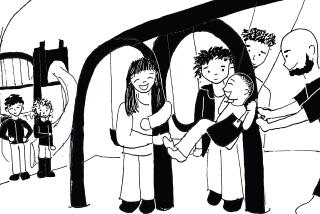Conquering New Worlds as a Way of Life
SAN RAMON — It took Trung Dung three tries before he escaped Vietnam on a fishing boat. He then spent a year in a refugee camp before landing in America with a sprinkling of English and $2 in his pocket.
Looking back, he remembers hope, not hardship.
“When I grew up, it’s just like there is no opportunity. There is no future,” he said. But on coming to the United States, “suddenly, I see all this opportunity that I have.”
Fifteen years later, Dung (pronounced Young) is an Internet success story, founder and chief technology officer of the software maker OnDisplay Inc., which has seen its stock triple since going public in December.
“You try, and then good things happen,” he said.
Based in San Ramon, a commuter city on the outskirts of Silicon Valley, OnDisplay makes software that allows Web site operators to retrieve information from other sites and present it in a convenient format. That means they don’t lose visitors or customers to other sites.
Dung is in partnership with former Sybase database division head Mark Pine, 45, who was lured out of early retirement after a chance meeting with Dung about five years ago.
OnDisplay employs about 100 people and has 120 customers, including Sabre Inc.’s Travelocity, which uses the software to get information from different hotel and airline sites and display prices and availability to customers.
The company specializes in the growing field of business-to-business software, known as B2B, that concentrates on finding ways to make it easier for businesses to swap information.
OnDisplay announced in January it was buying Cambridge, Mass.-based Oberon Software Inc. for about $180.7 million. Oberon makes software that helps companies deliver online business services faster.
It’s all a long way from Dung’s modest beginnings.
Dung, 32, started out life as the relatively privileged son of a small town mayor in South Vietnam. But after the North Vietnamese conquered in 1975 his world fell apart. His father was jailed; their property confiscated. His mother began plotting their escape.
The first attempt, when Dung was 15, failed when the fishing boat never showed up. A year later, Dung’s mother scraped together enough to buy him a place on a boat, but that trip was cut short when a patrol boat swooped in.
The teen-age Dung was thrown into jail with hard-core criminals. “Quite an experience,” he recalled with a dry laugh.
Released from jail, Dung went back home. His mother had no money for another escape attempt, so she bartered her courage for a spot on another boat, offering to take on the perilous job of middleman between the boat owner and people who wanted to leave.
“It’s very risky because people can just turn you in and people get jealous because many people want to get out. She put her life on the line,” said Dung.
The third try was a success. After a week at sea, the travelers reached an oil rig owned by Indonesia and were given asylum.
A year in a refugee camp followed--Dung was joined by his sister after three months--and then it was on to Boston. He arrived on a cold May day armed with a rough working knowledge of English, $2 a friend had given him and determination.
Officials wanted the 17-year-old Dung to go into 10th grade. But he took the high school equivalency exam instead, passing by one point, and applied to the University of Massachusetts at Boston.
Three years later, he’d finished a double degree in math and computer science as well as 90% of a master’s program, all while working 30 hours a week.
“Remember,” he said, “this is like coming from a place, a desert, where there’s no water and, going to the United States, it’s like suddenly you jump into the ocean and it’s great. It’s just wonderful to have the opportunity.”
By 1990, Dung’s family was reunited and by 1994, he was working for an e-commerce software computer company, Open Market Inc. Then came his second plunge into the unknown.
Intrigued with the burgeoning world of the Internet, he had been wondering for a while how to make it easier to retrieve and use data. His curiosity took a practical turn when leaders at his Buddhist temple asked him to create a Vietnamese mailing list.
Dung found a way to get the names from the Internet but not without some tedious cutting and pasting. So, he came up with a shortcut: software that would allow him to stay on one site while getting information from others.
Then he started thinking about the commercial possibilities. In 1996, he quit his job to work full time on his new idea. His family was furious.
“It was crazy. (My father) was going to disown me,” he said with a grin.
Venture capital companies were interested in Dung’s ideas, but leery of his inexperience. At one point he was about to accept $100,000 for 33% of his company.
Then a former colleague introduced him to Pine, who had taken up ranching after retiring early in 1994 but was looking for a challenge. When Pine agreed to work with Dung, venture capital became available and the company was able to raise $35 million from investors before going public.
Dung, who has retained a 9.5% share of the company, is modest about the courage it took to forsake the stability of a steady paycheck for the high-risk Internet world.
“Once I start thinking about this possibility, it becomes very hard to do anything else but keep thinking about it. It was like the only way I can function is to do it,” he said.






